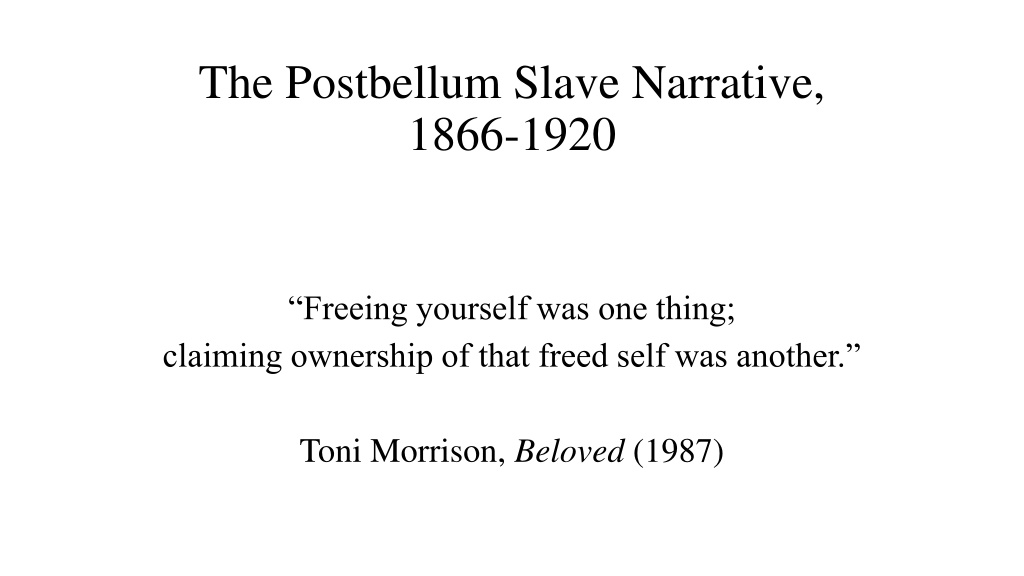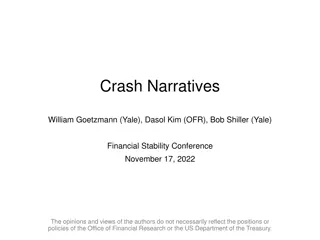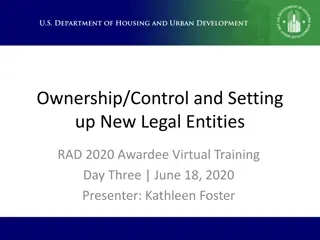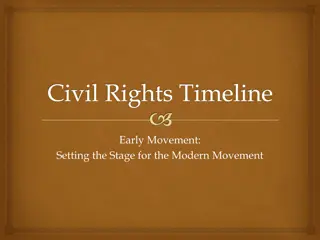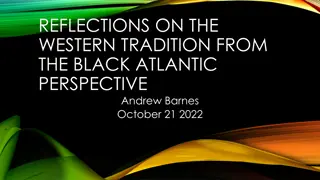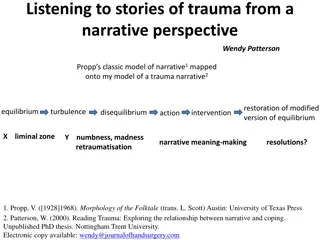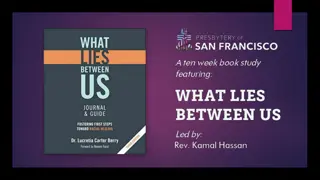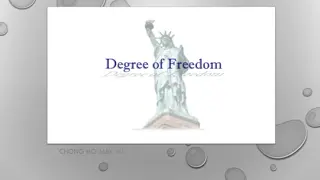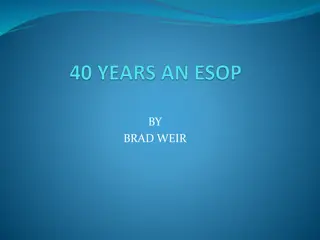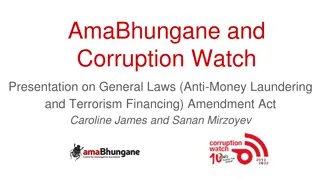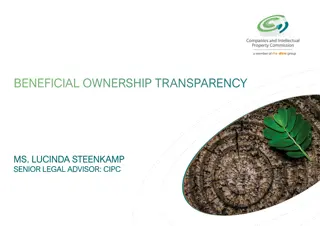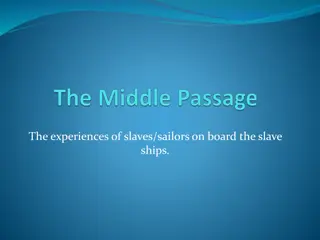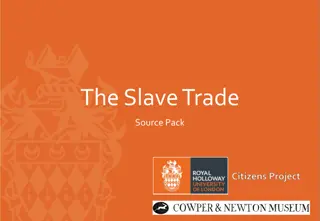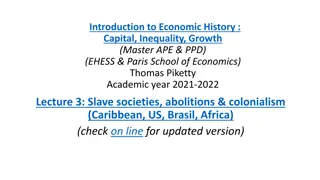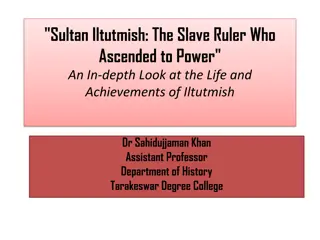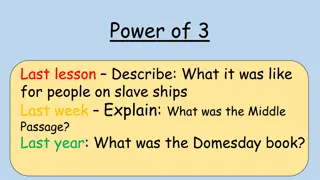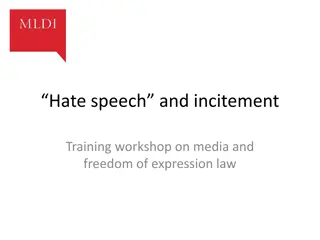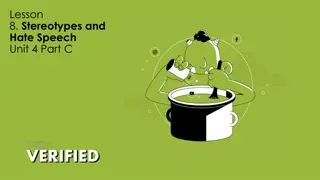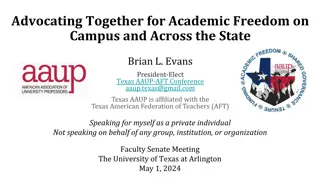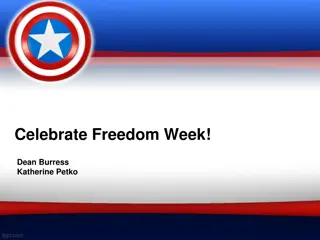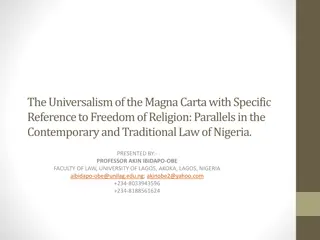Postbellum Slave Narratives: Ownership and Freedom
Explore the postbellum era through narratives of former slaves and free Blacks, highlighting the struggle for ownership of freedom. From antebellum to postbellum slave narrators, discover the places of publication and voices advocating for education, protection, and equality. Witness the journey of individuals like Sojourner Truth, Frederick Douglass, and John Quincy Adams in their quest for self-realization and empowerment.
Download Presentation

Please find below an Image/Link to download the presentation.
The content on the website is provided AS IS for your information and personal use only. It may not be sold, licensed, or shared on other websites without obtaining consent from the author. Download presentation by click this link. If you encounter any issues during the download, it is possible that the publisher has removed the file from their server.
E N D
Presentation Transcript
The Postbellum Slave Narrative, 1866-1920 Freeing yourself was one thing; claiming ownership of that freed self was another. Toni Morrison, Beloved (1987)
Narratives of Former Slaves vs. Free Blacks Narratives, 1865-1920 1800-1865: 87 Slave Narratives, 1.3/year. 1800-1865: 4 Free Black Narratives: Jarena Lee (preacher, 1836); Zilpha Elaw (preacher, 1846); Nancy Prince (social entrepreneur, 1850); William G. Allen (educator, 1853). See also The Life and Adventures of a Haunted Convict by Austin Reed (c. 1859, unpublished; Random House, 2016). 1866-1901: 58 Slave Narratives, 1.66/year. 1866-1901: 7 Free Black Narratives: J.H. Magee (minister, 1873); Tunis Campbell (politician, 1877); Julia Foote (preacher, 1879); James Still (naturopath, 1877); John Malvin (community activist, 1879), Daniel Payne (minister, 1888), J.M. Langston (politician, 1894). 1902-1920: 20 Slave Narratives, 1.1/year 1902-1920: 8 Narratives by Free Blacks: Mifflin W. Gibbs (businessman, 1902); Mrs. Henry Linden (businesswoman, 1907); Thomas O. Fuller (minister politician, 1910); A. H. Newton (minister, 1910); Wm. Pickens (teacher, 1911); Wm. H. Holtzclaw (1915); J.D. Corrothers (journalist poet, 1916); Wm. J. Edwards (educator, 1918).
Antebellum Slave Narrators in the Postbellum Era Sojourner Truth, Olive Gilbert, and Frances W. Titus, Narrative of Sojourner Truth, A Bondswoman of Olden Times (Boston, 1875; rev. 1884). William Wells Brown, My Southern Home (Boston, 1880). Frederick Douglass, Life and Times (Hartford, CT, 1881; rev. 1882 and 1892). Josiah Henson, An Autobiography of Rev. Josiah Henson ("Uncle Tom") from 1789-1881 (London, Ontario, 1881).
Antebellum and Postbellum Slave Narratives: Places of Publication Antebellum places of publication East Coast cities: Boston, NYC, Philadelphia, London. Postbellum places of publication Migration cities: Harrisburg, PA; St. Louis; Milwaukee; Detroit; Worcester, MA; Norwich, CT; Cincinnati, Chicago. Cities in the South: Atlanta; Raleigh, NC; Knoxville, TN; Baltimore; Louisville.
John Quincy Adams, Narrative of the Life of John Quincy Adams (Harrisburg, PA, 1872), 15. Now we are free. What do we want. We want education; we want protection; we want plenty of work; we want good pay for it, but not any more or less than any one else; we want good trades, such as good mechanics' trades; we just want a good chance to get them, and then you will see the down-trodden race rise up. I am one of those that is trying to rise up, if I can, by the help of God and my friends that desire to me rise and be useful to my race. I am trying to make myself as useful as I can among my people, but feeling my incapacity of doing so at this time I thought by writing this little book and circulating it among my friends it would help me very much indeed.
Elizabeth Hobbs Keckley, Behind the Scenes, or, Thirty Years a Slave and Four Years in the White House (New York: G.W. Carleton, 1868)
From Behind the Scenes (New York,1868) From the age of four I had been raised in a hardy school had been taught to rely upon myself, and to prepare myself to render assistance to others. . . . The precepts that I then treasured and practised I believe developed those principles of character which have enabled me to triumph over so many difficulties. Notwithstanding all the wrongs that slavery heaped upon me, I can bless it for one thing youth s important lesson of self-reliance (19-20). Each principle, to acquire moral force, must come to us from the fire of the crucible; the fire may inflict unjust punishment, but then it purifies and renders stronger the principle (xii).
From Douglass, Life and Times (Hartford, CT, 1881), 447-448. Now that slavery was destroyed, and the slave and the master stood upon equal ground, I was not only willing to meet him, but was very glad to do so. . . . He was to me no longer a slaveholder either in fact or in spirit, and I regarded him as I did myself, a victim of the circumstances of birth, education, law, and custom. . . . We addressed each other simultaneously, he calling me Marshal Douglass, and I, as I had always called him, Captain Auld. Hearing myself called by him Marshal Douglass, I instantly broke up the formal nature of the meeting by saying, not Marshal, but Frederick to you as formerly. We shook hands cordially, and in the act of doing so, he, having been long stricken with palsy, shed tears as men thus afflicted will do when excited by any deep emotion. The sight of him, the changes which time had wrought in him, his tremulous hands constantly in motion, and all the circumstances of his condition affected me deeply, and for a time choked my voice and made me speechless.
Narratives by Fugitives from U.S. Slavery as a percentage of Total Slave Narratives 1825 1865: 69 slave narratives, 43 by fugitives 62% 1866 1901: 58 slave narratives, 22 by fugitives 38%
From Henry Clay Bruce, The New Man: Twenty-Nine Years a Slave. Twenty-Nine Years a Free Man (1895), 38-39. There were thousands of high-toned and high-spirited slaves, who had as much self-respect as their masters, and who were industrious, reliable and truthful, and could be depended upon by their masters in all cases. These slaves knew that they had no rights under the laws of the land, and that they were, by those same laws, the chattels of their masters. . . . Yet they did not give up in abject servility, but held up their heads and proceeded to do the next best thing under the circumstances, which was, to so live and act as to win the confidence of their masters, which could only be done by faithful service and an upright life. Such slaves as these were always the reliables, and the ones whom the master trusted and seldom had occasion to even scold for neglect of duty. They spent their lives in their master s service, and reared up their children in the same service. . . . When they were freed by the war, these traits which they had exhibited for generations to such good effect, were brought into greater activity, and have been largely instrumental in making the record of which we feel so proud to-day.
From Washington, Up From Slavery (1901), 16. When we rid ourselves of prejudice, or racial feeling, and look facts in the face, we must acknowledge that, notwithstanding the cruelty and moral wrong of slavery, the ten million Negroes inhabiting this country, who themselves or whose ancestors went through the school of American slavery, are in a stronger and more hopeful condition, materially, intellectually, morally, and religiously, than is true of an equal number of black people in any other portion of the globe.
Norvel Blair, Life of Norvel Blair, of Grundy County, State of Illinois (Joliet, IL, 1880), 11. I and my family have been basely robbed, and I am determined the world shall know it, and, therefore, I publish this book. . . . But a colored man in the State of Illinois, and in the town of Morris, Grundy County, cannot even have a book printed to defend himself, wife and children from Republicans they have the money to buy up and subsadise the press, that I have been taught to believe could not be bought. . . . We worked hard to accumulate some property, and as soon as we did so by honest industry, then we were robbed and the Republican thieves come to take our lives and our property, too.
Norvel Blair, Life of Norvel Blair, of Grundy County, State of Illinois (Joliet, IL, 1880), 15. They steals every cent that an honest colored man works an earns, and then they gives him no justice in the courts, because the courts are controlled by the Republicans, and the colored man must be the voting chattel and must give their earnings to the Northern Republican aristocrat, and if he refuses, then they say: WHY WE FREED YOU, and you are nothing but a damed set of niggers. I say the Republicans did not free us we fought on the battlefield for our freedom. . . . I wants to be a freeman in the highest sense, and would just as soon be a Southern slave as the slave of a Northern Republican, who gets no justice unless he is willing to be a slave and to let um take all of his hard earnings.
Lucy Ann Berry Delaney, From the Darkness Cometh the Light (c. 1891), 63-64. If this sketch is taken up for just a moment of your life, it may settle the problem in your mind, if not in others, Can the negro race succeed, proportionately, as well as the whites, if given the same chance and an equal start?
James L. Smith, Autobiography (Norwich, CT, 1881), 86, 102. In my repeated visits to Heathsville, I observed but little improvement since the great rebellion; there have been but few houses built for the last thirty years. The condition of the colored people is improving very fast, for many of them are buying lands and building, and thus preparing homes for themselves. Their condition is much better than those who once owned them. The old ex-slave holders are dying off very fast. As they have no one to cultivate their large plantations, and can not do it themselves, they are obliged to divide them up and sell them to the freedmen. . . . Can this nation, that has advanced so rapidly in the cause of freedom, go backwards so, much as to re-enslave a people that have assisted in fighting its battles? Forbid it, justice! forbid it, humanity! forbid it, ye spirits of our fathers, still hovering over us! forbid it, our Country!
Peter Randolph, From Slave Cabin to the Pulpit (Boston, 1893), 137. Freedom and the right of franchise have come to the colored man through the terrible ordeal of war. The question that is paramount to all questions is: Shall the results of the war be recognized? This question the North must ask herself, and put it to the South, and demand an answer. Nowhere in our broad land North or South are freedom and citizenship accorded to colored people as to others.
